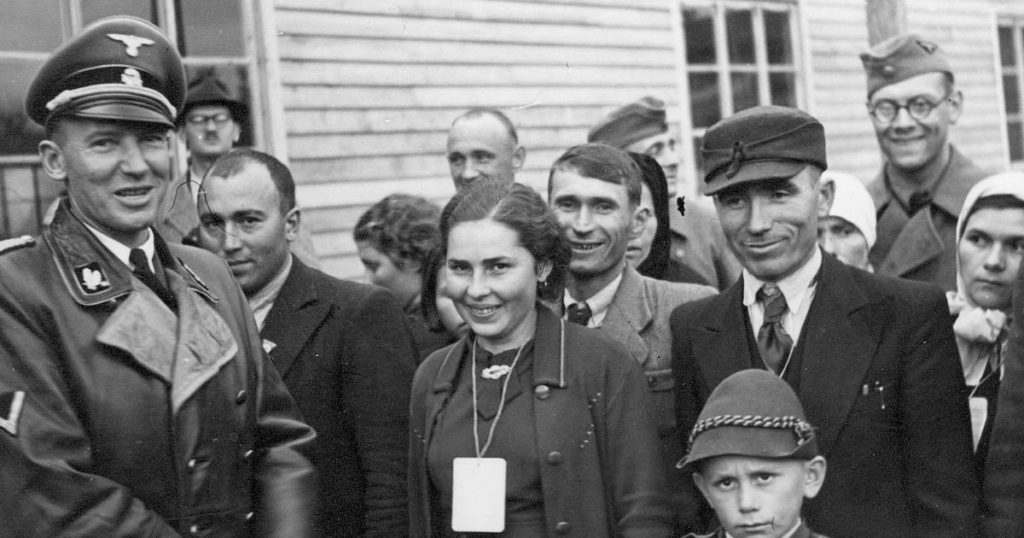Family Secrets
A writer’s personal quest to expose a mass murderer who escaped punishment

The Ratline: The Exalted Life and Mysterious Death of a Nazi Fugitive by Philippe Sands; Knopf, 448 pp., $30
An ardent young Viennese Nazi, Otto Wächter won his stripes and the attention of Adolf Hitler by joining the July 1934 putsch against the Austrian government, which had turned against Hitler and banned the local party. The revolt was botched and failed. Now a hunted man, Wächter slipped over the German border to the embrace of Nazi friends.
When Hitler annexed Austria in the 1938 Anschluss, Wächter was well positioned for a climb to power. His godfather was Arthur Seyss-Inquart, a leading Austrian Nazi apparatchik. After the occupation of Poland, Wächter was named governor of Krakow, where he supervised the creation of the infamous Jewish ghetto there. Then he became governor of Nazi-occupied Galicia, today part of Ukraine. Under Wächter’s two-year administration, more than half a million Jews died. Simon Wiesenthal, the Nazi-hunter, thought the true figure was closer to 800,000.
That any such monstrous number leaves Wächter a virtual unknown among Nazi villains says a great deal about the scale of the Holocaust—and the number of villains. Hans Frank, Wächter’s boss as governor-general of occupied Poland, was hanged after the postwar Nuremberg trials for the death of four million Jews—yet even his name doesn’t stand out in the grisly pantheon dominated by Goebbels, Goering, Himmler, Heydrich, Bormann, Eichmann, Mengele … Otto Wächter is, very relatively, small fry—if not quite ordinary, then emblematic.
The Ratline is Phillipe Sands’s narrative quest to examine Wächter’s rise and fall in meticulous detail. Its special resonance comes as Sands traces Wächter’s legacy in contemporary Europe through the strenuous efforts of his living descendants to disbelieve the incontrovertible facts the author presents.
When Hitler committed suicide at the end of April 1945 and the Third Reich collapsed under the onslaught of Allied and Russian forces, Wächter was among those high-ranking Nazis who chose neither to take his own life nor to face justice at Nuremberg. Instead, he fled to the Alps and lived on the run for four years, again a hunted man. His accommodating wife, Charlotte, a leading exemplar of denial in this book, helped him stay alive and connected to their six children.
Finally, Wächter made his way to Rome and, with the help of Vatican insiders, lived under a false name while preparing his escape to Argentina along the so-called “ratline” of Nazis who found refuge and new identities in South America. The plan never came to fruition. Wächter died in a Vatican hospital in July 1949. Some family members believe he was murdered. Those who wanted him dead—Poles, Nazi-hunters, Americans, Russians—were legion.
The Ratline is a massive forensic exercise, its findings so teasingly unraveled that the author’s dogged quest becomes as much a part of this narrative as the story of his protagonist. A British lawyer, Sands is best known as an academic specialist in 20th-century war crimes and for his much-praised East West Street, which covers some of the same territory as this book does. Wächter has long haunted Sands, whose grandfather was among the Polish Jews in the Galician capital, Lemberg, as Lvov was then known, murdered under Wächter’s operation to render the territory judenfrei, free of Jews.
In the course of uncovering Wächter’s tale, Sands pursues and patiently waltzes his protagonist’s fourth-born child, Horst Wächter, keeper of the family flame. The archival fruit of this testy courtship was more than 13 gigabytes of digital images—thousands of letters, clippings, photographs, tapes, and other atmospheric and incriminating documents lovingly preserved by Charlotte and passed down to her children and grandchildren.
Sands relishes minutiae, intriguing dead-ends, historical might-have-beens. He goes all the way to Albuquerque to track down a hunch. He checks in with his friend and neighbor John le Carré for his views on the matter. The sheer volume of such diversions may tire some readers. But the author’s diligence is palpable as he continues, ever so gently, to confront Horst and other family members with his evidence. Some of the most arresting portraits in The Ratline are of these 21st-century scions of the Holocaust insisting that Otto Wächter was just not that kind of man.
Charlotte’s ability to look the other way and lead a comfortable life through her husband’s reign of terror (and serial womanizing) is a leitmotif. As well as saving all the memorabilia, she tape-recorded her thoughts years later, elaborately justifying Otto’s true motivations. “He always took pleasure in doing what he thought was the right thing to do … Till the very end he refused to compromise his conscience, but sometimes he just couldn’t do what he thought was right.”
“For me it would have been impossible that he would have done it,” Horst tells Sands at an early meeting. “You have put my father on the same level as the executors of the Holocaust. I see no sense in continuing this.” Yet he does, even as his relatives think he shouldn’t. More than 200 pages later, he is still adamant. “The theory that my father is a criminal, I cannot accept.”
Finally, Sands presents Horst with evidence that Horst had been lying all along: a 2007 note in his own hand to his nephew admitting Otto’s role and enclosing incriminating documents. Horst had failed to destroy the note in the archive he gave Sands. Otto Wächter “knew everything, observed it and consented in principle,” Horst tells the nephew. Twisting in the wind before his inquisitor, Horst is reduced to pitiable rationalizations. Sands: “I remained silent, there was nothing left to say. The documents and tapes spoke for themselves, then and now.”

